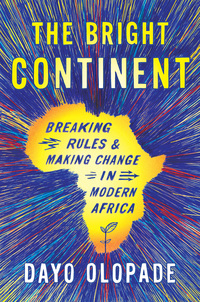Source of book image: http://www.hmhco.com/shop/books/the-bright-continent/9780547678313#
(p. 21) Africa’s gains have come not because of Western largess or painful structural adjustment programs set out by the likes of the International Monetary Fund, Olopade argues, nor are they the work of governments. They are largely the fruit of Africans’ efforts to help themselves, through creative means that sometimes involve breaking the rules.
. . .
She excavates a hopeful narrative about a continent on the rise, “a libertarian celebration of hustling, hacking and free-form development.”
The best solutions, according to Olopade, are local, developed by people closest to the problem, not bureaucrats in Washington or Brussels: the South African gynecologist who operates out of two shipping containers stacked together, the Kenyan family who take over an abandoned plot of land to grow vegetables to eat and sell.
Central to Olopade’s thesis is the concept of kanju, a term that describes “the specific creativity born from African difficulty.” It is the rule-bending ethos that makes it possible to get things done in the face of headaches like crumbling infrastructure, corrupt bureaucracy and tightfisted banks unwilling to make loans to people without political connections.
Many countries have these kinds of hacks and workarounds. In India, the term is jugaad, and it has had its moment in the sun as a business school concept. India runs on this informal hacking of the system that makes life and business possible.
For the full review, see:
LYDIA POLGREEN. “Home Improvement.” The New York Times Book Review (Sun., APRIL 13, 2014): 21.
(Note: ellipsis added; italics in original.)
(Note: the online version of the review has the date APRIL 11, 2014, and has the title “Home Improvement; ‘The Bright Continent,’ by Dayo Olopade.”)
The book under review is:
Olopade, Dayo. The Bright Continent: Breaking Rules and Making Change in Modern Africa. New York: Houghton Mifflin Harcourt Publishing Co., 2014.


